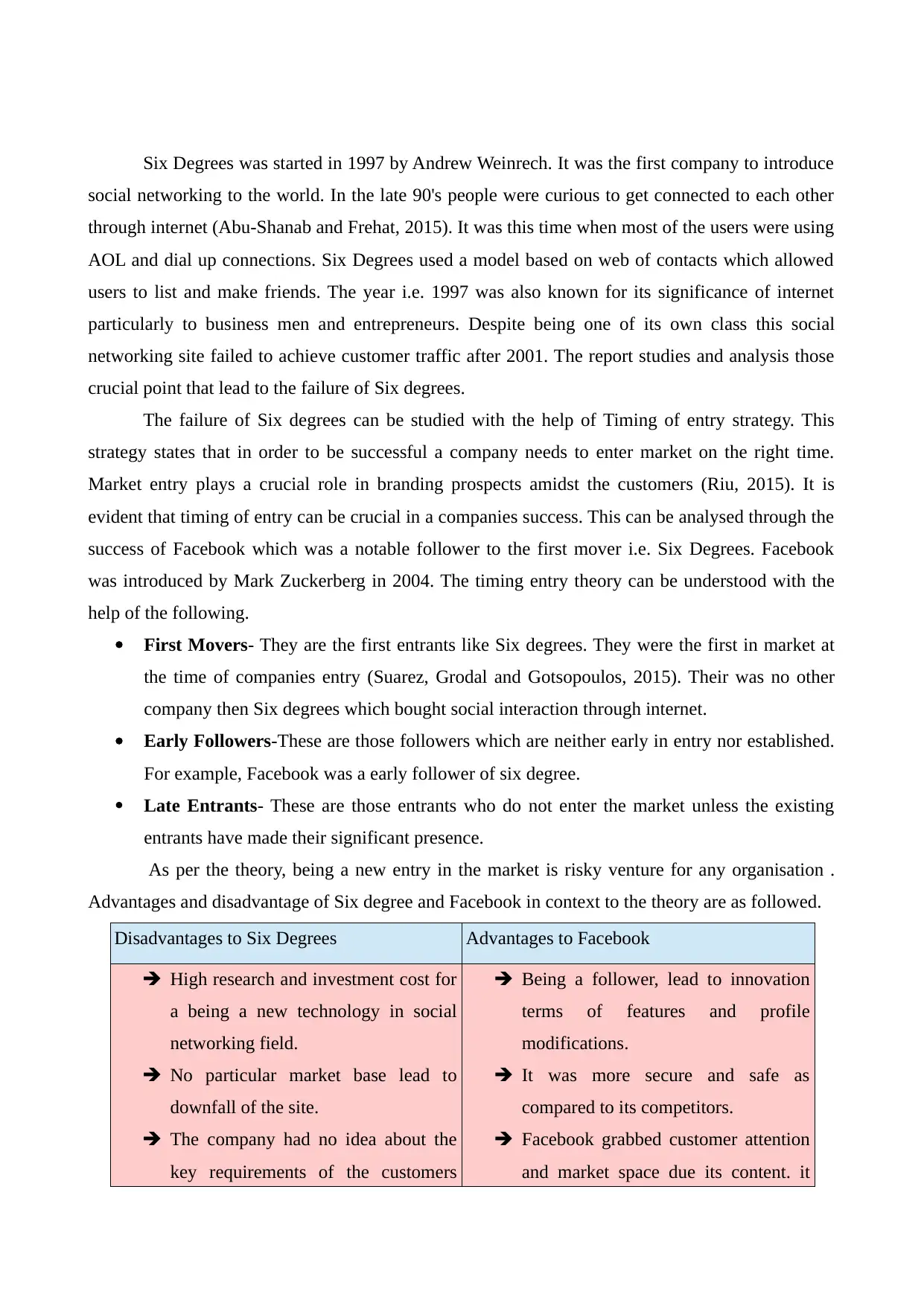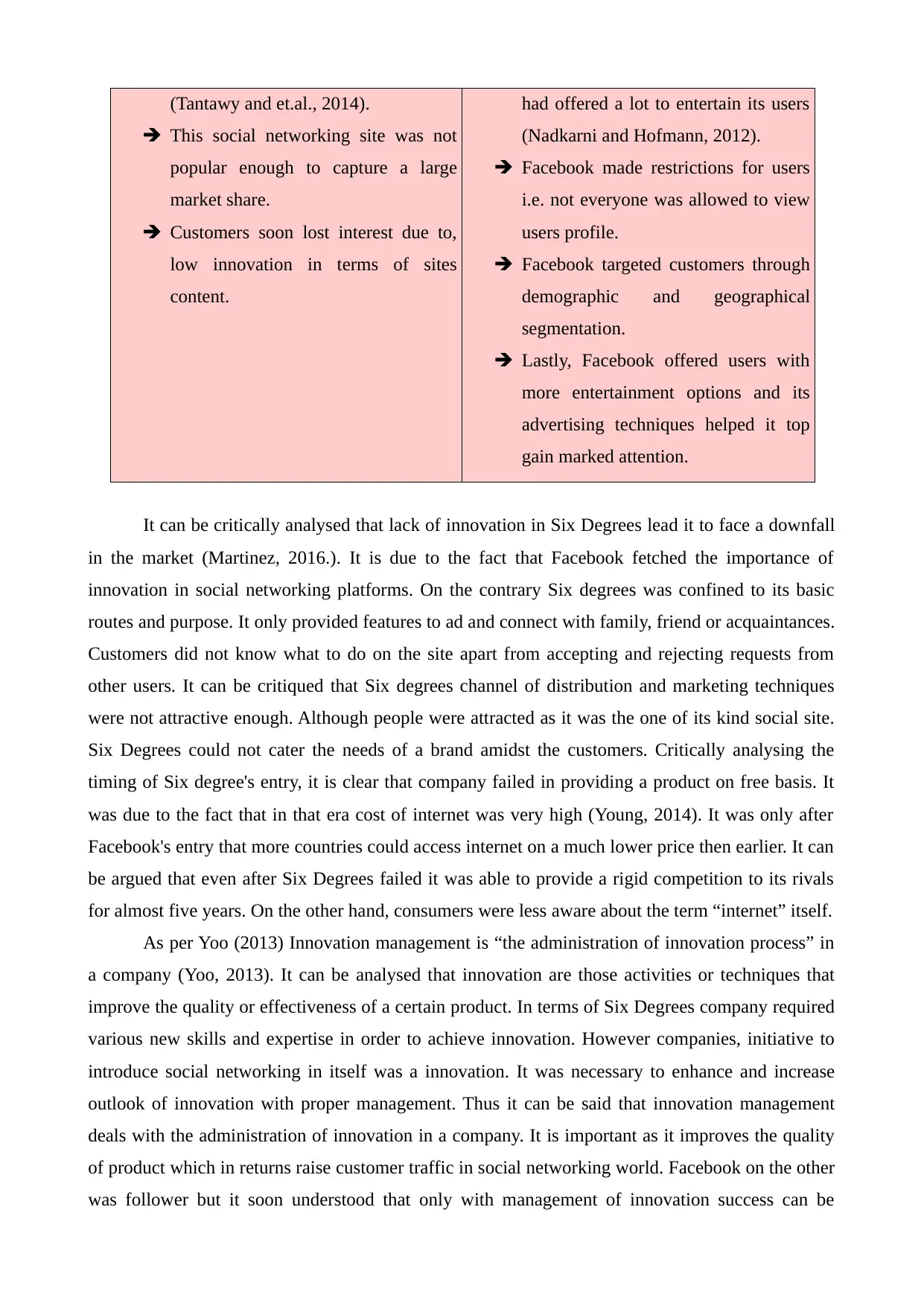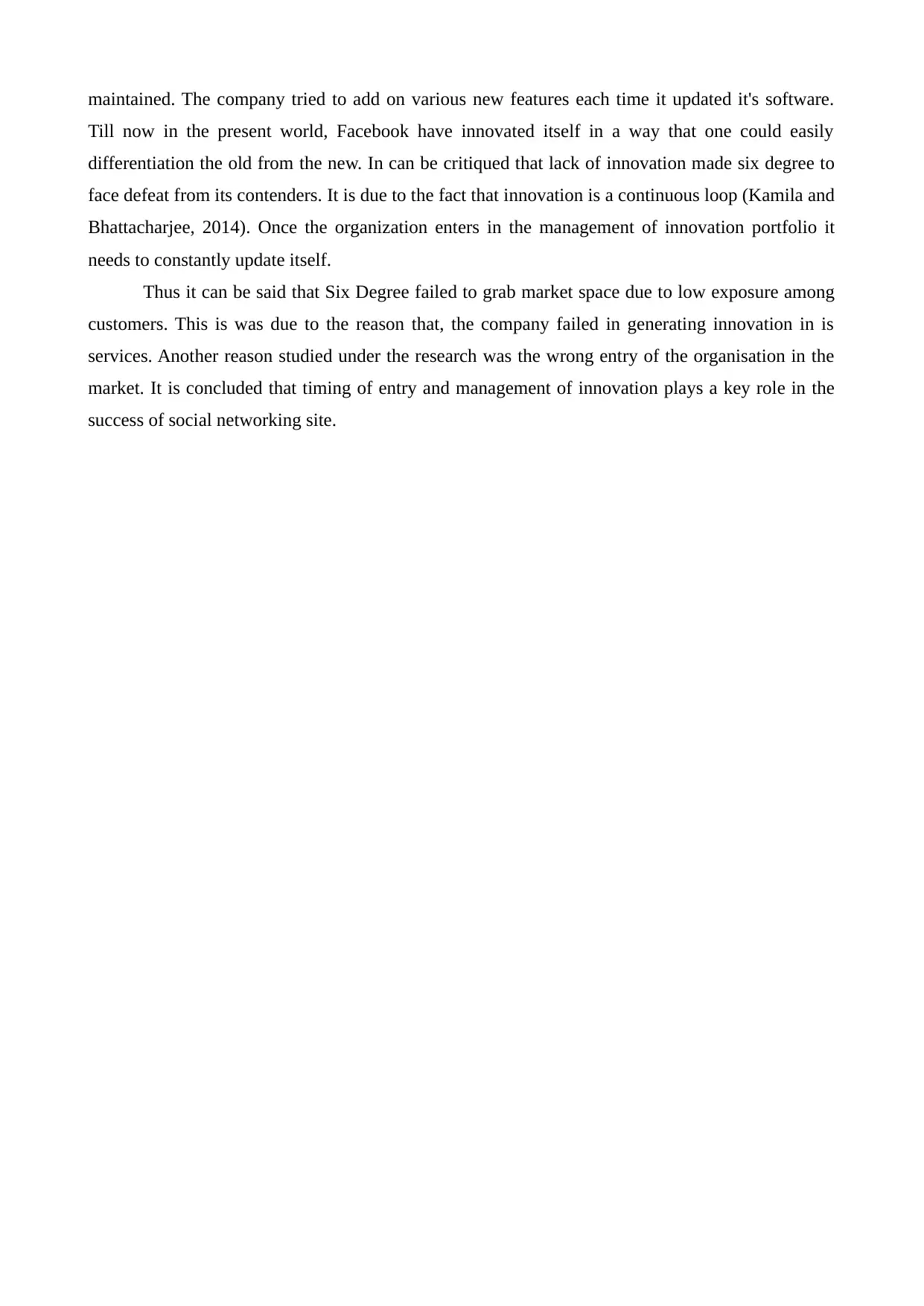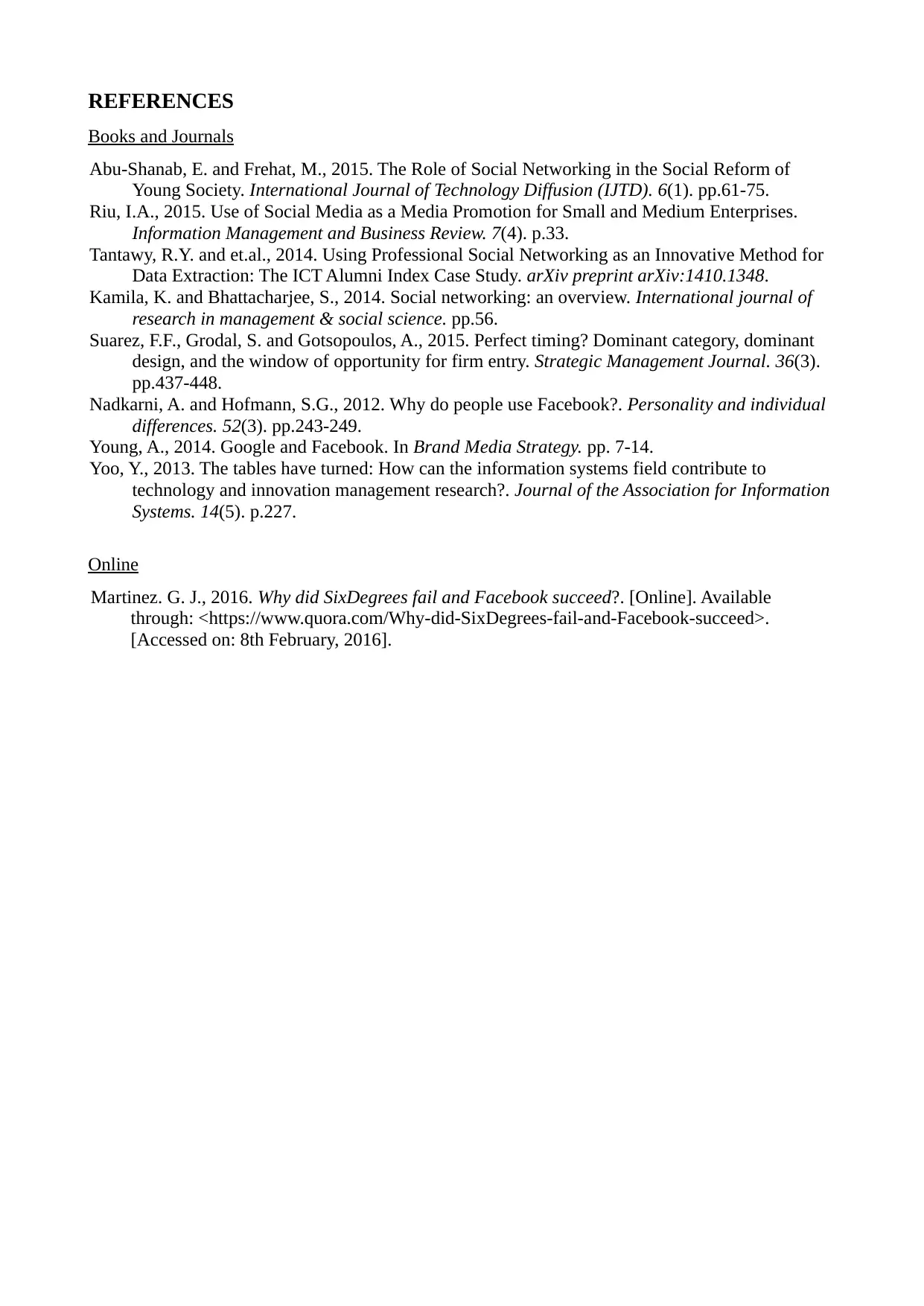Business Strategy: Six Degrees' Failure and Facebook's Success
VerifiedAdded on 2020/01/21
|5
|1490
|274
Report
AI Summary
This report provides a comparative analysis of SixDegrees.com and Facebook, examining the factors that contributed to their contrasting outcomes. It explores the concept of timing of entry strategy, highlighting how Six Degrees, as a first mover, failed to capitalize on its early advantage due to high research and investment costs, lack of a defined market base, and insufficient innovation. The report contrasts this with Facebook's success as an early follower, emphasizing its advantages in terms of innovation, security, user engagement, and effective marketing. The analysis delves into the importance of innovation management, demonstrating how Facebook's continuous updates and features helped it capture a large market share, while Six Degrees' lack of innovation led to its decline. The report concludes that timing of entry and innovation management are crucial for the success of social networking sites, offering valuable insights into business strategy and market dynamics. The report also includes references to relevant academic journals and online sources to support its findings.

From SixDegrees.com to Facebook
Paraphrase This Document
Need a fresh take? Get an instant paraphrase of this document with our AI Paraphraser

Six Degrees was started in 1997 by Andrew Weinrech. It was the first company to introduce
social networking to the world. In the late 90's people were curious to get connected to each other
through internet (Abu-Shanab and Frehat, 2015). It was this time when most of the users were using
AOL and dial up connections. Six Degrees used a model based on web of contacts which allowed
users to list and make friends. The year i.e. 1997 was also known for its significance of internet
particularly to business men and entrepreneurs. Despite being one of its own class this social
networking site failed to achieve customer traffic after 2001. The report studies and analysis those
crucial point that lead to the failure of Six degrees.
The failure of Six degrees can be studied with the help of Timing of entry strategy. This
strategy states that in order to be successful a company needs to enter market on the right time.
Market entry plays a crucial role in branding prospects amidst the customers (Riu, 2015). It is
evident that timing of entry can be crucial in a companies success. This can be analysed through the
success of Facebook which was a notable follower to the first mover i.e. Six Degrees. Facebook
was introduced by Mark Zuckerberg in 2004. The timing entry theory can be understood with the
help of the following.
First Movers- They are the first entrants like Six degrees. They were the first in market at
the time of companies entry (Suarez, Grodal and Gotsopoulos, 2015). Their was no other
company then Six degrees which bought social interaction through internet.
Early Followers-These are those followers which are neither early in entry nor established.
For example, Facebook was a early follower of six degree.
Late Entrants- These are those entrants who do not enter the market unless the existing
entrants have made their significant presence.
As per the theory, being a new entry in the market is risky venture for any organisation .
Advantages and disadvantage of Six degree and Facebook in context to the theory are as followed.
Disadvantages to Six Degrees Advantages to Facebook
High research and investment cost for
a being a new technology in social
networking field.
No particular market base lead to
downfall of the site.
The company had no idea about the
key requirements of the customers
Being a follower, lead to innovation
terms of features and profile
modifications.
It was more secure and safe as
compared to its competitors.
Facebook grabbed customer attention
and market space due its content. it
social networking to the world. In the late 90's people were curious to get connected to each other
through internet (Abu-Shanab and Frehat, 2015). It was this time when most of the users were using
AOL and dial up connections. Six Degrees used a model based on web of contacts which allowed
users to list and make friends. The year i.e. 1997 was also known for its significance of internet
particularly to business men and entrepreneurs. Despite being one of its own class this social
networking site failed to achieve customer traffic after 2001. The report studies and analysis those
crucial point that lead to the failure of Six degrees.
The failure of Six degrees can be studied with the help of Timing of entry strategy. This
strategy states that in order to be successful a company needs to enter market on the right time.
Market entry plays a crucial role in branding prospects amidst the customers (Riu, 2015). It is
evident that timing of entry can be crucial in a companies success. This can be analysed through the
success of Facebook which was a notable follower to the first mover i.e. Six Degrees. Facebook
was introduced by Mark Zuckerberg in 2004. The timing entry theory can be understood with the
help of the following.
First Movers- They are the first entrants like Six degrees. They were the first in market at
the time of companies entry (Suarez, Grodal and Gotsopoulos, 2015). Their was no other
company then Six degrees which bought social interaction through internet.
Early Followers-These are those followers which are neither early in entry nor established.
For example, Facebook was a early follower of six degree.
Late Entrants- These are those entrants who do not enter the market unless the existing
entrants have made their significant presence.
As per the theory, being a new entry in the market is risky venture for any organisation .
Advantages and disadvantage of Six degree and Facebook in context to the theory are as followed.
Disadvantages to Six Degrees Advantages to Facebook
High research and investment cost for
a being a new technology in social
networking field.
No particular market base lead to
downfall of the site.
The company had no idea about the
key requirements of the customers
Being a follower, lead to innovation
terms of features and profile
modifications.
It was more secure and safe as
compared to its competitors.
Facebook grabbed customer attention
and market space due its content. it

(Tantawy and et.al., 2014).
This social networking site was not
popular enough to capture a large
market share.
Customers soon lost interest due to,
low innovation in terms of sites
content.
had offered a lot to entertain its users
(Nadkarni and Hofmann, 2012).
Facebook made restrictions for users
i.e. not everyone was allowed to view
users profile.
Facebook targeted customers through
demographic and geographical
segmentation.
Lastly, Facebook offered users with
more entertainment options and its
advertising techniques helped it top
gain marked attention.
It can be critically analysed that lack of innovation in Six Degrees lead it to face a downfall
in the market (Martinez, 2016.). It is due to the fact that Facebook fetched the importance of
innovation in social networking platforms. On the contrary Six degrees was confined to its basic
routes and purpose. It only provided features to ad and connect with family, friend or acquaintances.
Customers did not know what to do on the site apart from accepting and rejecting requests from
other users. It can be critiqued that Six degrees channel of distribution and marketing techniques
were not attractive enough. Although people were attracted as it was the one of its kind social site.
Six Degrees could not cater the needs of a brand amidst the customers. Critically analysing the
timing of Six degree's entry, it is clear that company failed in providing a product on free basis. It
was due to the fact that in that era cost of internet was very high (Young, 2014). It was only after
Facebook's entry that more countries could access internet on a much lower price then earlier. It can
be argued that even after Six Degrees failed it was able to provide a rigid competition to its rivals
for almost five years. On the other hand, consumers were less aware about the term “internet” itself.
As per Yoo (2013) Innovation management is “the administration of innovation process” in
a company (Yoo, 2013). It can be analysed that innovation are those activities or techniques that
improve the quality or effectiveness of a certain product. In terms of Six Degrees company required
various new skills and expertise in order to achieve innovation. However companies, initiative to
introduce social networking in itself was a innovation. It was necessary to enhance and increase
outlook of innovation with proper management. Thus it can be said that innovation management
deals with the administration of innovation in a company. It is important as it improves the quality
of product which in returns raise customer traffic in social networking world. Facebook on the other
was follower but it soon understood that only with management of innovation success can be
This social networking site was not
popular enough to capture a large
market share.
Customers soon lost interest due to,
low innovation in terms of sites
content.
had offered a lot to entertain its users
(Nadkarni and Hofmann, 2012).
Facebook made restrictions for users
i.e. not everyone was allowed to view
users profile.
Facebook targeted customers through
demographic and geographical
segmentation.
Lastly, Facebook offered users with
more entertainment options and its
advertising techniques helped it top
gain marked attention.
It can be critically analysed that lack of innovation in Six Degrees lead it to face a downfall
in the market (Martinez, 2016.). It is due to the fact that Facebook fetched the importance of
innovation in social networking platforms. On the contrary Six degrees was confined to its basic
routes and purpose. It only provided features to ad and connect with family, friend or acquaintances.
Customers did not know what to do on the site apart from accepting and rejecting requests from
other users. It can be critiqued that Six degrees channel of distribution and marketing techniques
were not attractive enough. Although people were attracted as it was the one of its kind social site.
Six Degrees could not cater the needs of a brand amidst the customers. Critically analysing the
timing of Six degree's entry, it is clear that company failed in providing a product on free basis. It
was due to the fact that in that era cost of internet was very high (Young, 2014). It was only after
Facebook's entry that more countries could access internet on a much lower price then earlier. It can
be argued that even after Six Degrees failed it was able to provide a rigid competition to its rivals
for almost five years. On the other hand, consumers were less aware about the term “internet” itself.
As per Yoo (2013) Innovation management is “the administration of innovation process” in
a company (Yoo, 2013). It can be analysed that innovation are those activities or techniques that
improve the quality or effectiveness of a certain product. In terms of Six Degrees company required
various new skills and expertise in order to achieve innovation. However companies, initiative to
introduce social networking in itself was a innovation. It was necessary to enhance and increase
outlook of innovation with proper management. Thus it can be said that innovation management
deals with the administration of innovation in a company. It is important as it improves the quality
of product which in returns raise customer traffic in social networking world. Facebook on the other
was follower but it soon understood that only with management of innovation success can be
⊘ This is a preview!⊘
Do you want full access?
Subscribe today to unlock all pages.

Trusted by 1+ million students worldwide

maintained. The company tried to add on various new features each time it updated it's software.
Till now in the present world, Facebook have innovated itself in a way that one could easily
differentiation the old from the new. In can be critiqued that lack of innovation made six degree to
face defeat from its contenders. It is due to the fact that innovation is a continuous loop (Kamila and
Bhattacharjee, 2014). Once the organization enters in the management of innovation portfolio it
needs to constantly update itself.
Thus it can be said that Six Degree failed to grab market space due to low exposure among
customers. This is was due to the reason that, the company failed in generating innovation in is
services. Another reason studied under the research was the wrong entry of the organisation in the
market. It is concluded that timing of entry and management of innovation plays a key role in the
success of social networking site.
Till now in the present world, Facebook have innovated itself in a way that one could easily
differentiation the old from the new. In can be critiqued that lack of innovation made six degree to
face defeat from its contenders. It is due to the fact that innovation is a continuous loop (Kamila and
Bhattacharjee, 2014). Once the organization enters in the management of innovation portfolio it
needs to constantly update itself.
Thus it can be said that Six Degree failed to grab market space due to low exposure among
customers. This is was due to the reason that, the company failed in generating innovation in is
services. Another reason studied under the research was the wrong entry of the organisation in the
market. It is concluded that timing of entry and management of innovation plays a key role in the
success of social networking site.
Paraphrase This Document
Need a fresh take? Get an instant paraphrase of this document with our AI Paraphraser

REFERENCES
Books and Journals
Abu-Shanab, E. and Frehat, M., 2015. The Role of Social Networking in the Social Reform of
Young Society. International Journal of Technology Diffusion (IJTD). 6(1). pp.61-75.
Riu, I.A., 2015. Use of Social Media as a Media Promotion for Small and Medium Enterprises.
Information Management and Business Review. 7(4). p.33.
Tantawy, R.Y. and et.al., 2014. Using Professional Social Networking as an Innovative Method for
Data Extraction: The ICT Alumni Index Case Study. arXiv preprint arXiv:1410.1348.
Kamila, K. and Bhattacharjee, S., 2014. Social networking: an overview. International journal of
research in management & social science. pp.56.
Suarez, F.F., Grodal, S. and Gotsopoulos, A., 2015. Perfect timing? Dominant category, dominant
design, and the window of opportunity for firm entry. Strategic Management Journal. 36(3).
pp.437-448.
Nadkarni, A. and Hofmann, S.G., 2012. Why do people use Facebook?. Personality and individual
differences. 52(3). pp.243-249.
Young, A., 2014. Google and Facebook. In Brand Media Strategy. pp. 7-14.
Yoo, Y., 2013. The tables have turned: How can the information systems field contribute to
technology and innovation management research?. Journal of the Association for Information
Systems. 14(5). p.227.
Online
Martinez. G. J., 2016. Why did SixDegrees fail and Facebook succeed?. [Online]. Available
through: <https://www.quora.com/Why-did-SixDegrees-fail-and-Facebook-succeed>.
[Accessed on: 8th February, 2016].
Books and Journals
Abu-Shanab, E. and Frehat, M., 2015. The Role of Social Networking in the Social Reform of
Young Society. International Journal of Technology Diffusion (IJTD). 6(1). pp.61-75.
Riu, I.A., 2015. Use of Social Media as a Media Promotion for Small and Medium Enterprises.
Information Management and Business Review. 7(4). p.33.
Tantawy, R.Y. and et.al., 2014. Using Professional Social Networking as an Innovative Method for
Data Extraction: The ICT Alumni Index Case Study. arXiv preprint arXiv:1410.1348.
Kamila, K. and Bhattacharjee, S., 2014. Social networking: an overview. International journal of
research in management & social science. pp.56.
Suarez, F.F., Grodal, S. and Gotsopoulos, A., 2015. Perfect timing? Dominant category, dominant
design, and the window of opportunity for firm entry. Strategic Management Journal. 36(3).
pp.437-448.
Nadkarni, A. and Hofmann, S.G., 2012. Why do people use Facebook?. Personality and individual
differences. 52(3). pp.243-249.
Young, A., 2014. Google and Facebook. In Brand Media Strategy. pp. 7-14.
Yoo, Y., 2013. The tables have turned: How can the information systems field contribute to
technology and innovation management research?. Journal of the Association for Information
Systems. 14(5). p.227.
Online
Martinez. G. J., 2016. Why did SixDegrees fail and Facebook succeed?. [Online]. Available
through: <https://www.quora.com/Why-did-SixDegrees-fail-and-Facebook-succeed>.
[Accessed on: 8th February, 2016].
1 out of 5
Related Documents
Your All-in-One AI-Powered Toolkit for Academic Success.
+13062052269
info@desklib.com
Available 24*7 on WhatsApp / Email
![[object Object]](/_next/static/media/star-bottom.7253800d.svg)
Unlock your academic potential
Copyright © 2020–2026 A2Z Services. All Rights Reserved. Developed and managed by ZUCOL.





